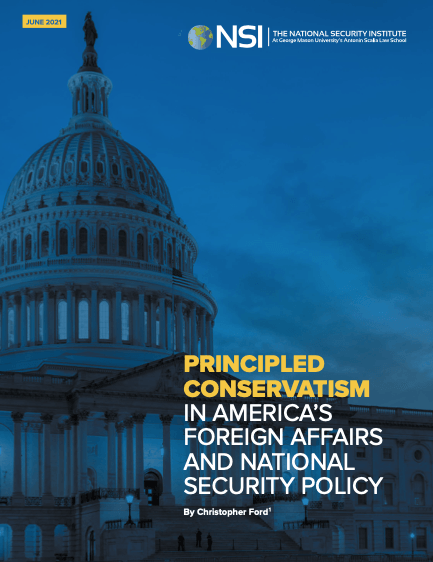Principled Conservatism in America's Foreign Affairs and National Security Policy
Dr. Christopher Ford • July 15, 2021
On July 2, 2021, Dr. Ford published a paper on "Principled Conservatism in America's Foreign Affairs and National Security Policy" with the National Security Institute (NSI) at the George Mason University's Antonin Scalia Law School. The full paper can be found here from NSI, or it may be downloaded through the button below.

July 2, 2021
National Security Institute Publishes New Paper:
“Principled Conservatism in America’s Foreign Affairs and National Security Policy”
Arlington, VA – Today, the National Security Institute (NSI) at George Mason University’s Antonin Scalia Law School published its latest paper, “Principled Conservatism in America’s Foreign Affairs and National Security Policy,” by NSI Distinguished Fellow Christopher Ford.
In the hope of catalyzing policy conversations and drawing out points of potential agreement between policy stakeholders, in this paper, former diplomat and Republican political appointee Dr. Christopher Ford offers his thoughts on what a broad vision for ‘principled conservatism’ in U.S. foreign and national security policy might look like. Topics in the paper include:
- Great power competition, democracy, and the rule of law;
- The role of professional expertise in policymaking;
- International allies and partners, terrorists and rogue regimes;
- Trade, immigration, and energy; and
- Political dialogue and Constitutionalism.
“Historically, politicians and political parties have often used time spent out of office as an opportunity to learn from past successes and failures, to recover a shared vision of the direction and objectives of political life, and to formulate the policy agendas that they hope will eventually return them to power with the trust of the country’s voters. American conservatives are out of power today, and have both an opportunity and a need for such soul-searching and vision-recovery,” said NSI Distinguished Fellow Dr. Christopher Ford. “At a time, moreover, when both of the main U.S. political parties are riven by factional conflict between centrists and radicals, I hope this paper will provide food for thought for anyone interested in the future of U.S. politics and policymaking,” he added.
“The exercise of creating a platform that allows an out-of-power political movement to return to power often begins with considering foundational beliefs that underpin its ideas,” said NSI Director of Strategy Matthew Heiman. “Christopher Ford’s paper lays out a case for what he describes as ‘principled conservatism’ in national security affairs. Covering the waterfront of foreign policy challenges, this paper should be considered by conservatives that are debating U.S. engagement with the world as well as liberals that will need to respond to their opponents’ arguments.”

Below is the prepared text upon which Dr. Ford based his shorter oral remarks to the U.S-China Nuclear Workshop on November 19, 2025, convened by the Protect on Managing the Atom and the Council on Strategic Risks, held at the Belfer Center at Harvard University’s John F. Kennedy School of Government.








